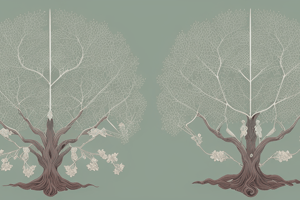Podcast
Questions and Answers
Which branch of government is responsible for interpreting laws?
Which branch of government is responsible for interpreting laws?
- Legislative
- Administrative
- Executive
- Judicial (correct)
In a democracy, who holds supreme power?
In a democracy, who holds supreme power?
- Citizens (correct)
- A single individual
- Religious leaders
- The military
What is the main function of the executive branch of government?
What is the main function of the executive branch of government?
- Enforcing laws (correct)
- Creating laws
- Interpreting laws
- Collecting taxes
Which form of government is characterized by rule by a small group of people?
Which form of government is characterized by rule by a small group of people?
What is the principle of government that emphasizes the importance of open and accessible information?
What is the principle of government that emphasizes the importance of open and accessible information?
Which of the following is NOT a core function of government?
Which of the following is NOT a core function of government?
Which principle of good governance emphasizes that everyone is subject to the law?
Which principle of good governance emphasizes that everyone is subject to the law?
Which of the following is NOT a characteristic of a well-functioning government?
Which of the following is NOT a characteristic of a well-functioning government?
Which type of government system features a centralized authority with limited power delegated to local or regional administrations?
Which type of government system features a centralized authority with limited power delegated to local or regional administrations?
Which of the following describes a legal framework that defines the basic organization and principles of a government?
Which of the following describes a legal framework that defines the basic organization and principles of a government?
Which legal system governs the interactions and disputes between individuals or organizations?
Which legal system governs the interactions and disputes between individuals or organizations?
In which type of political system does the executive branch derive its authority from the legislative branch?
In which type of political system does the executive branch derive its authority from the legislative branch?
What is the defining characteristic of a totalitarian political system?
What is the defining characteristic of a totalitarian political system?
Flashcards
Federal Government
Federal Government
A central government with delegated powers alongside regional governments.
Unitary Government
Unitary Government
A single, centralized government with limited powers for local authorities.
Confederation
Confederation
A union of diverse jurisdictions with limited central government power.
Parliamentary System
Parliamentary System
Signup and view all the flashcards
Totalitarianism
Totalitarianism
Signup and view all the flashcards
Branches of Government
Branches of Government
Signup and view all the flashcards
Legislative Branch
Legislative Branch
Signup and view all the flashcards
Judicial Branch
Judicial Branch
Signup and view all the flashcards
Democracy
Democracy
Signup and view all the flashcards
Republic
Republic
Signup and view all the flashcards
Accountability
Accountability
Signup and view all the flashcards
Transparency
Transparency
Signup and view all the flashcards
National Security
National Security
Signup and view all the flashcards
Study Notes
Branches of Government
- Governments typically have three branches: legislative, executive, and judicial.
- The legislative branch creates laws.
- The executive branch enforces laws.
- The judicial branch interprets laws.
- Branches often have checks and balances to prevent overreach.
Forms of Government
- Democracy: Citizens hold supreme power, either directly or through elected representatives.
- Republic: A form of democracy where citizens elect representatives to make decisions.
- Monarchy: Power held by a single person, often inheriting their position.
- Dictatorship: Power held by a single person or small group without accountability.
- Oligarchy: Power held by a small group or a specific class.
- Theocracy: Power held by religious leaders or groups.
Functions of Government
- Maintaining Order: Enforcing laws, providing safety, and preventing crime.
- Providing Public Services: Infrastructure (roads, bridges, schools), public health, and environmental protection.
- Economic Management: Establishing economic systems, overseeing markets, setting policies, and managing economic issues.
- National Security: Protecting from internal and external threats.
- Social Welfare: Providing services for citizens in need (healthcare, unemployment benefits, poverty support).
Principles of Good Governance
- Accountability: Government officials responsible for their actions.
- Transparency: Government processes and information publicly accessible.
- Rule of Law: All people and institutions subject to and accountable under law.
- Participation: Citizens have opportunities to participate in decision-making.
- Responsiveness: Government responsive to public needs and concerns.
- Effectiveness and Efficiency: Government actions achieving objectives effectively.
- Equity and Inclusiveness: Government policies fostering equal opportunities and inclusion.
- Sustainability: Government practices maintaining environmental health for current and future generations.
Levels of Government
- Federal: Central government with delegated power, alongside regional/state governments.
- Unitary: Single, centralized government with limited local/regional authority.
- Confederation: Diverse jurisdictions united for a purpose, with limited central power.
Types of Laws
- Constitutional Law: Defines government principles and structure.
- Administrative Law: Regulates governmental actions and agencies.
- Criminal Law: Establishes crimes and punishments.
- Civil Law: Regulates disputes between individuals/organizations.
- International Law: Governs relationships between countries.
Government Structures
- Parliamentary System: Executive branch accountable to and drawing legitimacy from the legislative branch.
- Presidential System: Executive branch separate from the legislative branch, with independent legitimacy.
Political Systems
- Authoritarianism: Power held by a single person or small group, with minimal citizen participation.
- Totalitarianism: Extreme authoritarianism, controlling all aspects of public and private life.
Studying That Suits You
Use AI to generate personalized quizzes and flashcards to suit your learning preferences.



